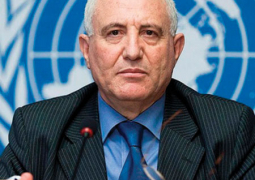The Ministry of Health and Social Welfare Fatim Badjie last Friday 25 March launched polio campaign 2011 in
In his welcoming remarks, the deputy Mayor of KMC, Yusupha Sanyang, said global statistics indicate that cases of polio have been remarkably low across the globe, and however, with fresh outbreak being reported in sub-Sahara
He said the government of The Gambia, in collaboration with national, international, bilateral and multilateral agencies, is leaving no stone unturned in making sure that every child counts in the planned polio immunization campaign.
He added that the
For his part, WHO representative Dr Thomas Sukwa said the event marked the kick-off of polio national immunization days in The Gambia, and The Gambia has joined 15 other countries in West and Central Africa in this synchronized exercise aimed at consolidating the gains so far made and further prevent importation of polio in areas declared polio free and in 2004 The Gambia was certified polio free, since then no confirmed case of polio has been recorded.
He said, this is due to political commitment and good routine polio immunization coverage of over 90% since 1990 and The Gambia EPI programme is one of the best in the WHO African Region, a status "we cannot afford to lose". In this country the target is to immunize 291,425 children of 0-5 years, he says.
He thanked the
The Minister of Health and Social Welfare, Ms Fatim Badjie, in her launching statement, said National Immunization Days is one of the strategies of polio eradication initiative.
She said that international initiative was declared at the World Health Assembly meeting in May 1988 and in four years afterwards, The
She said that The Gambia has made tremendous progress under the polio eradication initiative and last year there were five rounds of campaigns, all of which have registered coverage of more than 90 percent.
The campaign, she added, has contributed significantly in the reduction in infant and childhood morbidity and mortality.
"The
According to her, the World Health Organization (WHO) has estimated that about 265,000 children are needlessly crippled every year in the developing countries alone and if polio is eradicated, a lot of family money that should have gone into treating and caring for a child suffering from the disease will be saved and utilized for other family needs.
She added that, the dates for the synchoronised NIDs are 25 to 28 March 2011 and 22 to 25 April for the first and second round respectively and this year's polio campaign aims to cover 391,425 children aged 0-5 years with two doses of the oral polio vaccine. The vaccination teams will move from house to house to vaccinate all eligible children, she says.




